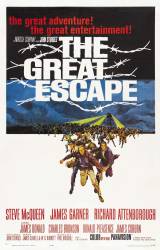Other mistake: When Hilts and Ives are taken down to the cooler for the very first time, just after arriving at the camp, watch the wall as the door is closed by the guard behind Ives - it very obviously moves as the door slams shut.
Other mistake: Ramsay sports on his tunic the ribbons for the Distinguished Service Order, the Military Cross, either the 1914 or 1914/15 Star, the British War Medal and the Victory Medal. Unfortunately, the ribbon bar for the last three has been sewn onto his tunic upside-down - it reads, left to right as seen, VM, BWM, Star, when it should read Star, BWM, VM.
Other mistake: When the three Americans invite the British to join their 4th of July celebration, Hilts plays the flute with his right hand the wrong way round on the instrument.
Other mistake: When Steve McQueen first comes to the camp he voluntarily gives up a pair of wire cutters. No POW would have done that. Tools of that nature were too hard to come by.






Suggested correction: These prisoners were being transferred from other camps to this camp. As Big X said, "they are putting all their eggs in one basket." It's likely they are carrying possessions they've acquired during their time in captivity.
What "possessions"? Do you think they had Oxfam shops in POW camps during World War 2? They would be dressed in their combat fatigues and nothing else.
They would have possessions as they would receive parcels from home and Red Cross parcels.
Prisoners of war would receive Red Cross parcels, and may have also scrounged, made or been issued a few other bits and pieces. In particular, they'd probably have a change or two of underwear, some toiletries and a few books or games at the very least.
POWs acquired possessions by hand-making, scrounging, care packages, 'selling' watches and rings to guards or local civilians.
Agreed, there was always a bit of trading going on for little trinkets. As has happened in many wars.
Ssiscool ★
They were universally known for their trading and scrounging abilities. Remember these were the "worst of the worst" in offending.
stiiggy
Just to clarify. They weren't exactly the "worst of the worst" for bad or incorrigible behavior. They were the best at attempting to escape POW camps or otherwise subverting their German captors. The fed-up Germans decided to contain them all in one prison to stop the constant breakouts. They only succeeded in creating a POW "think tank" by pooling together the most talented escape artists who combined their skills and knowledge.
raywest ★
In international conflicts, in addition to prisoners regularly receiving Red Cross care packages, the Geneva Convention requires captors to treat all POWs humanely, and provide food, clothing, housing, medical treatment, and hygiene. As mentioned, these prisoners brought their belongings with them from other camps. International Red Cross inspectors monitor POW camps for compliance. Failure to comply with the rules constitutes war crimes, which are adjudicated after a conflict. Germany was generally compliant. POW camps were to detain captured soldiers and prevent them rejoining the war. They did not punish detainees as "criminals" but disciplined them when they were non-compliant or for other misbehavior. Once the war was over, POWs were repatriated.
raywest ★
The Great Escape was from a POW camp specifically set up to hold trouble makers from other camps. Also, sometimes people expect to be captured and prepare to for it! Today, during funeral of John Lewis, speakers repeatedly mentioned that he was carrying a backpack with 2 books, an apple, an orange and a tooth brush. Which haven't been seen since his head was beat in. A least one German Fortress commander, sworn to defend his fort until he and all those under his command were dead, surrendered with multiple suit cases to make his incarceration more comfortable. Like the character Yossarian in Catch-22. [Spoiler alert: he makes elaborate preparations to the paddle in a life raft from Italy to Sweden.].